#(gritting my teeth) fujimoto…….
Explore tagged Tumblr posts
Text


“what you say is totally boring”
#I’m coping#currently: bad!#they make me sick#I’m so sad these two dead kids are just puppets this is sooo#(gritting my teeth) fujimoto…….#chainsaw man#chainsaw man spoilers#chainsaw man part 2#csm part 2#asaden#asa mitaka#denji hayakawa#asa csm#denji csm
354 notes
·
View notes
Text
I know I rarely seem to complain about the quality of CSM, but I'm starting to grit my teeth to be honest: where's Asa ?
I know Denji is still the protagonist too, but almost the whole of the last arc was about CSM, I don't want her to be an excuse to serve Denji's development, or at least to be a well-written character who represents one of the cogs in the wheel for CSM in general.
I sincerely hope we'll be focusing on her again very soon, and I love seeing Denji through a third person's eyes and no longer following his point of view.
It sounds paradoxical but not only do I love seeing Denji from Asa's point of view (because it's either funny or touching) but I also love part 2 because I was following Asa, Asa for me is a monumental slap in the face in terms of character AND she brings something new to the table.
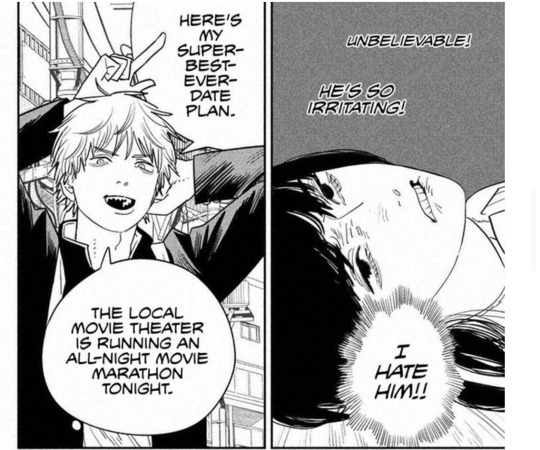
Denji's existential crises are necessary, but Fujimoto could just as easily deal with them from another point of view; I know we've had Nayuta's point of view at the moment, so in itself, we've become a little "detached" from Denji.
And in itself, it's incredible that she's finally being developed.
I'm not criticizing Denji's point of view, nor Nayuta's development, but in terms of balance and rhythm, I sincerely think we could have had the same subtlety with a faster treatment.
On its own, I'm afraid it feels long because the chapters are coming out one by one.
Still, it's time to give the microphone back to our heroine
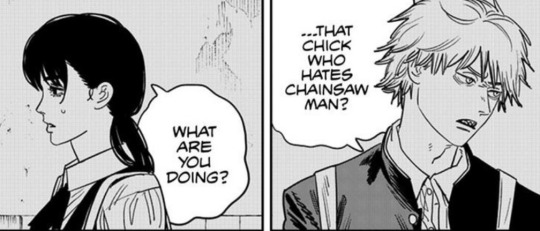
171 notes
·
View notes
Text
This is like... one of the gayest paneling I have ever seen in shounen, IT LOOKS SO INTENTIONAL ISTG. Fujimoto you can't keep get away from this.
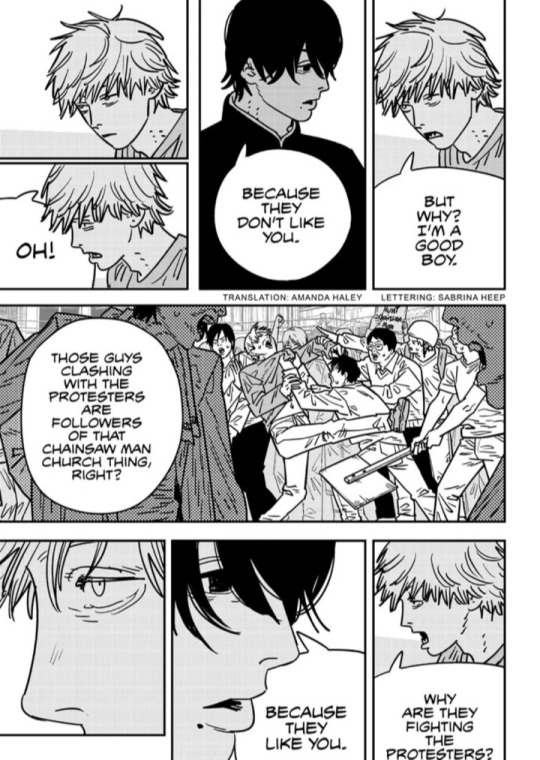
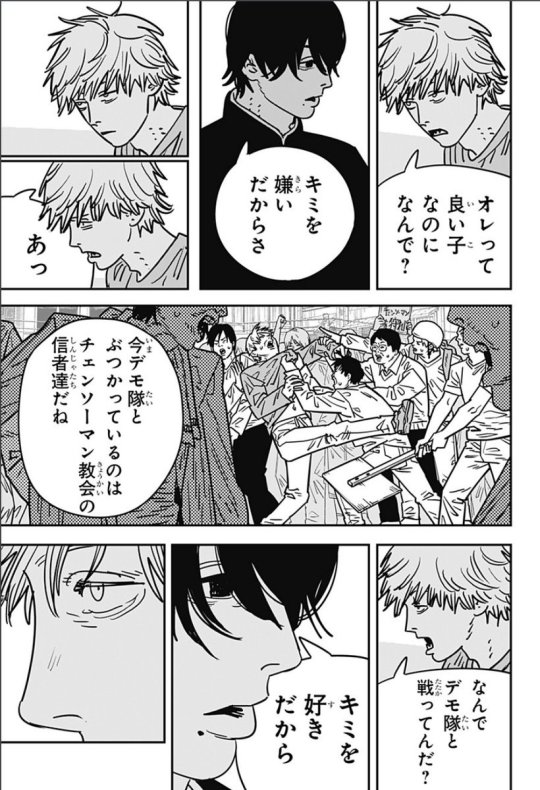
The romantic/platonic subtlety isn't very visible in English, in the original Japanese ver HOWEVER—
*open my eyes wide to make sure I'm not insane and hallucinating*
I don't have such knowledge on Japanese language but I could read it for a bit. In this exact scene where their expression is shown face to face, when they talk, they didn't use any specific plural pronoun (they/you all) except for context giver in the middle.
When we exclude the middle frame and directly translate other lines, up and below, we will have something like this.
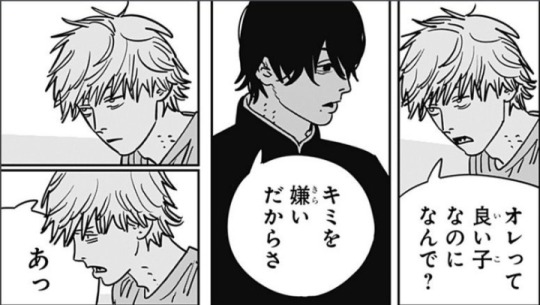
"Ore tte ii ko na no ni nande?" (But I am a good boy, why?)
"Kimi o kirai dakara sa." (Because you are hated)
*VERY DRAMATIC zoom in*
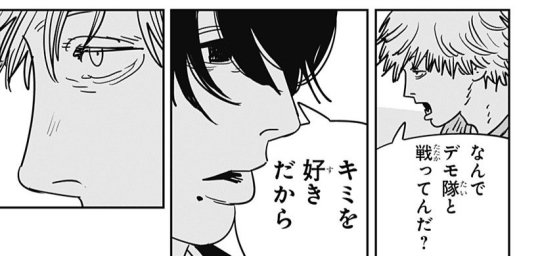
"Nande demo-tai to tatakatte nda?" (Why fighting the protesters?)
"Kimi o suki dakara." (Because you are adored/liked)
*gritting my teeth and punching the air* If we take a look at it again, that sounds like some sort of a VERY deliberate double meaning words right?
Since "Kimi o suki dakara" could mean "Because I like you" and it sounds like as if Yoshida also fighting for Denji versus people who hates him (the protester).
After that, it cut shorts to the next panel where Denji say this-
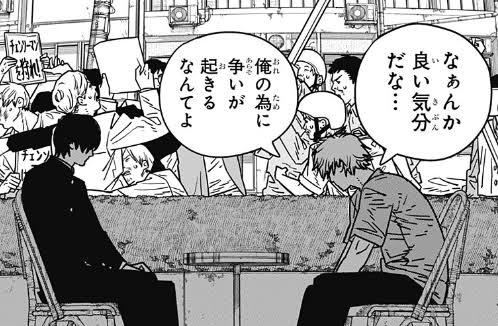
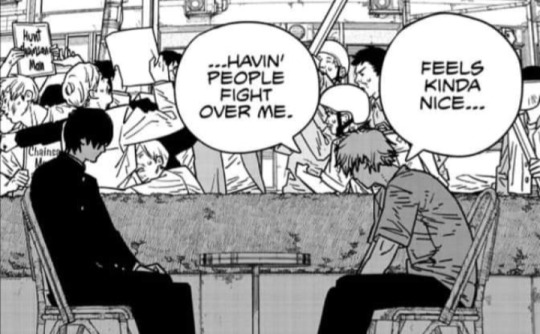
Then they had a brief moment of silence where Denji looked up at Yoshida and Yoshida's eyes remain hidden.

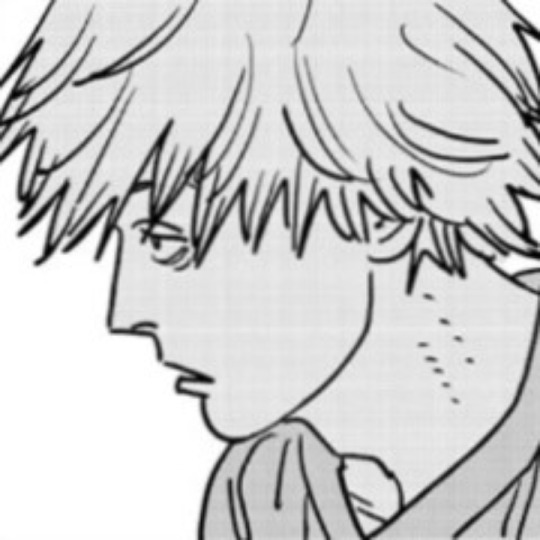
It's so??? Skskskskskk. Fujimoto, what kind of yoai are you sniffing when writing these two.
#yoshiden#yoshida hirofumi#denji#yoshida#yoshida x denji#chainsaw man#chainsaw man part 2#I know what you are fujimoto#It's like I go to yoshiden fan competition and turns out the biggest competitor is fujimoto himself#they go through confession to divorce arc in the span of 5 minutes without even married it's crazy#chainsaw man 133#csm 133#look at this juicy angst material#longing desperate gay boy Yoshida you will always be famous#akiangel still on top of chainsaw man mlm list though
390 notes
·
View notes
Text
THE SILENCE OF THE LAMBS
When my concerned parents faced the early and unpleasant realization that they were raising a ravenous little horror hound, it meant that they had to somehow split the difference between their strict curbing of my potentially mid-warping viewing habits, and their principled encouragement of unfettered reading. That must be how I came into possession of a copy of Thomas Harris' harrowing police procedural The Silence of the Lambs at the tender age of 10, even as the film adaptation was being touted by many viewers as The Scariest Movie of All Time. I carried that book around like the Bible well into my teenage years, reading and re-reading it with even greater fervor after my parents finally decided that the film was sophisticated enough for me to watch without it turning me into some kind of animal-torturing arsonist. (Said screening was chaperoned and accompanied by an academic post-viewing family discussion, of course) The decision seemed to make sense; after all, THE SILENCE OF THE LAMBS had swept the Oscars the year it was released, scooping up wins for Best Director, Best Actor, Best Actress, Best Adapted Screenplay, and Best Picture. This is not to say that my intellectual and art-appreciating family regarded the Academy as the ultimate arbiters of taste and achievement. I mention these accolades more to point out that, as my parents had surely noticed, the film holds a certain power over viewers on both sides of the high-low cultural divide, a spell that has hardly weakened in its twenty-seven years of life.
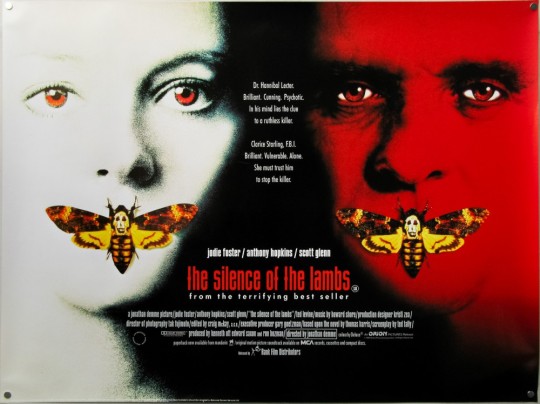
As a child, I certainly responded to the same things that piqued the general public: Anthony Hopkins' iconic performance as Hannibal "The Cannibal" Lecter, his ambiguous romance with purehearted FBI trainee Clarice Starling, and the controversial perversity of serial killer Buffalo Bill. Though the story shares the influence of real-life ghoul Ed Gein with classic shockers like PSYCHO and THE TEXAS CHAIN SAW MASSACRE, the impact of SILENCE is more akin to that of DRACULA. Much of the enduring discussion about the film revolves around the tantalizing chemistry between the preternaturally elegant Dr. Lecter and the virginal Starling; the rest is somewhat unfortunately focused on Ted Levine's eccentric performance as the (pseudo-) transsexual murderer at large, which has come under some understandable scrutiny. However, it would be unjust to reduce Jonathan Demme's movie to a gothic romance, or a gory shocker, or a campy cult item with ironic eroticism and a great soundtrack. There simply have to be better reasons for a movie to stick around this long, lingering in the minds of stuffy critics and the hoi polloi alike.
In preparing my statements about what makes THE SILENCE OF THE LAMBS stand out, I learned something very shocking: It began its life as the directorial project of Gene Hackman. Hackman eventually dropped out when the script produced by (Oscar-winner) Ted Tally turned out to be too violent. Prospective Starlings like Michelle Pfeiffer and Meg Ryan were similarly disgusted, so Demme got stuck with a less likely candidate in (Oscar-winner) Jodie Foster. Personally, I find (Oscar-winner) Demme himself to be an unlikely candidate. The director cut his teeth on exploitation movies under Roger Corman, and by the time of SILENCE, had distinguished himself as a hipster extraordinaire, directing classic performance videos for the Talking Heads and Spaulding Gray, as well as chic comedies speckled with cameos from the likes of John Waters, and underground music firebrands from New York's new wave scene. Time would prove that Demme and his frequent collaborator, cinematographer Tak Fujimoto, were perfect choices for this grim project, which only supports the idea that there is something more happening with SILENCE OF THE LAMBS than its gruesome violence and epic sexual tension.
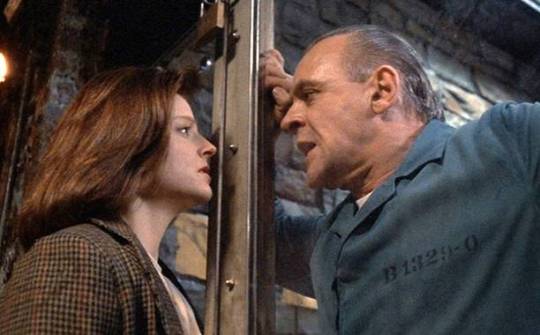
In light of these more famous elements, one might expect an adaptation of Thomas Harris' grim and seductive novel to be grandiose, expressionistic, swathed in a dense physical and emotional mist, rumbling with its own pomp and circumstance. An orphan from the hills of West Virginia, Clarice Starling is a tragic hero from the start, guarding her broken heart against a world of condescending and hostile men. Her mentor Jack Crawford seems to distinguish himself from the herd by assigning her the ambitious task of interviewing notorious serial killer Hannibal Lecter for the FBI's files--but in fact, Crawford is counting on Starling's feminine charms and naivety, secretly using her to manipulate Lecter into profiling a killer at large, Buffalo Bill. In spite of this nasty revelation, Starling sticks with it, suffering Lecter's high-minded insults and penetrative analysis of her character, and eventually earning his admiration. She proves herself not only brave and determined, but a detective of unparalleled wit and instinct, single-handedly taking down the polymorphously perverse Buffalo Bill in his moth-filled subterranean lair, rescuing a high-profile victim where the entire rest of the Federal Bureau of Investigation have failed.
This all seems to portend a bigger, louder movie than what has been committed to film. However, the book has a certain organic grit to it, something honest, downbeat and tragically real, which Demme and Fujimoto grasp instinctively. The film provides a dry, frank view of the life of Clarice Starling: the toil of academia, the drudgery of physical conditioning, the undermining attitudes of her mostly-male peers. Shot in West Virginia and Pennsylvania, Starling's world is bleak and desolate, but earnestly so, without the pageantry of the film noir and Universal horror movies with which it is so easily compared. Demme's education under B-movie king Corman shows here, and makes for a much more compelling iteration of the story than we might have from someone less accustomed to economy. While SILENCE has developed a reputation for its brutality, the film is not remotely so gore-drenched as many traumatized viewers would have you believe. That said, it may be the film's generally stark and desicated look, its workaday-ness, and its endless (wonderful) dialogic exchanges that throw into relief its comparatively minimal violence, which usually appears not in scenes of assault, but in crime scene photos or autopsy scenes.
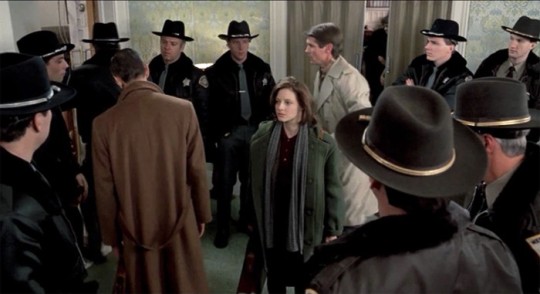
The blanched, dreary look of the film also offsets the emotional plight of Clarice Starling. She is afforded no real romance, external or internal. The petite and clear-eyed orphan is visibly used to, and exhausted by, the constant need to look out for herself, and SILENCE will see her shuffled from one humiliating personal trial to the next. She is led into a perilous situation by a mentor who pretends to respect her abilities, but who really counts on her to fall short of discovering his scam; She is trapped in roomfuls of macho cops who scarcely acknowledge her; She has to negotiate the sexual attention of evidence technicians and bureaucrats; She even has semen flung at her by a particularly rambunctious neighbor of Lecter's. (And how often do you see that in any movie? As gross as it is, it has a way of reinforcing the extreme adult-ness of Demme's often dry, methodical movie) And then of course, there is Lecter himself, who turns Starling's personal vulnerability into a form of currency with which she can buy the scant clues that lead her to her quarry. Instead of eroticizing the anomalous femininity that Starling brings to the traditionally masculine world of law enforcement, Demme constantly reminds you of her fear, her embarrassment, her alienation. One can also imagine the temptation to Ripley-fy the character, presenting her as a fully-formed badass not to be fucked with. Instead, by eschewing both these femme and fatale modes, Demme describes Clarice Starling as three-dimensional human being whose heroism is extremely hard-won. While the character is undeniably one of the great Strong Female Protagonists, Jodie Foster's performance somehow defies the cinematic semiotics of gender altogether, giving us a person whose most important qualities are purely psychological. Tak Fujimoto drives the point home by frequently filling the screen with closeups of her face, focusing us on what she thinks and says, taking the proverbial heat off her body. Even as Lecter probes her for painful biographical information, Starling's sexuality remains entirely private--still a rare thing in any movie with a lady lead.
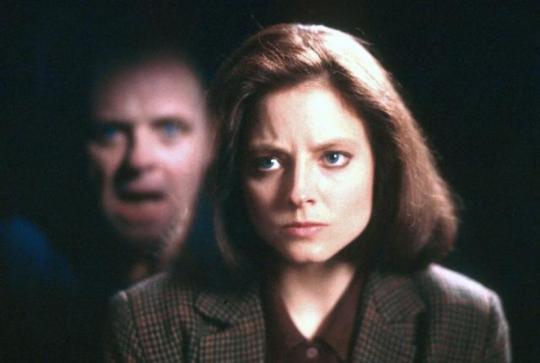
I don't mean to suggest that THE SILENCE OF THE LAMBS is principally successful because of its plucky girl detective--that contributes to its greatness, but not in the feminist fashion that I seem to be angling for. I am reviewing this movie presently because I recently found myself looking back on my own history with it, comparing my feelings with those of popular audiences, and thinking, "What is The Silence of the Lambs really about?" It can't be so beloved *only* due to the sexy slow burn between Anthony Hopkins' Count Dracula and Jodie Foster's Mina Harker. It can't be *just* a matter of the exotic insanity of the gender-bending madman sewing together the flesh of his victims and dancing provocatively to "Goodbye Horses" by Q Lazzarus (a sadly mysterious musician who Demme certainly knew from his involvement in the New York underground). All of these characters, and their respective dynamics, contribute to the important thrill of this movie, but not in the way that most people seem to think.
Rather like the director's earlier work with iconoclastic punk icons and indie auteurs, THE SILENCE OF THE LAMBS is about authenticity. Hannibal Lecter, the unparalleled genius whose culinary expertise is part of his murderous MO, is a serial killer because he has such refined taste and decorum that he cannot live peaceably among other people. He favors victims whom he perceives as tacky, pretentious and impertinent--Starling knows that he would never harm her because, as she famously remarks, "He would consider it rude." Lecter is fascinated, not by her youthful beauty as Crawford had hoped, but by her sincerity. Starling is brilliantly intelligent in her own right, as she proves through her police work, but she doesn't have an ironic bone in her body. She is the most unpretentious individual alive, and nothing could be more interesting to Lecter, who preys upon people who are untrue to others and to themselves. Meanwhile, we have Buffalo Bill, who is attempting to change his sex by crafting a full-body "woman suit"--but, as Lecter insists, the killer is not a "true transsexual" whose legitimate identity is that of the opposite sex. Buffalo Bill is someone who was reared by his abusive parents to hate himself so much, that he is compelled to escape his natural identity; becoming a woman is less important as a matter of self-actualization, than as a means of becoming an entirely different person, *any* different person. He has been so radically alienated from his own essence by this self-loathing, that he is incapable of authenticity of any kind.
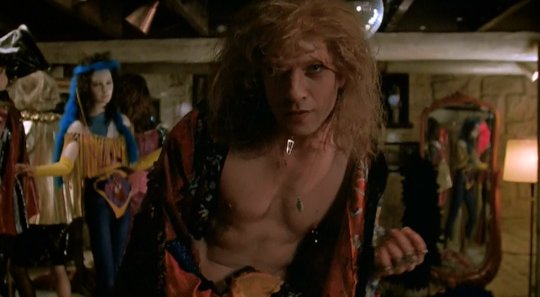
That, I really think, is the secret power of THE SILENCE OF THE LAMBS: the at-once satanic and profoundly innocent declaration, "to thine own self be true". I would really love to get into a deeper dive on this movie at some point, to discuss what I think must have been the very best and very last time that Anthony Hopkins gave us a fearless and unpredictable (and in this case, somewhat hilarious) performance; to insist that Ted Levine as Buffalo Bill and Brooke Smith as his would-be victim actually give the best performances in the whole movie; to talk about the problem of the Ubiquitous Daddy Figure (of whom there are no fewer than THREE in this movie) in so many narratives about powerful women; to simply analyze the movie's sly psychological techniques, like fully humanizing Brooke Smith *just* by showing her singing a few bars of a beloved pop song in closeup, immediately before her fate takes a disastrous turn. (I would probably not take such an opportunity to investigate accusations of homophobia and transphobia, which requires a smarter and more directly experienced voice than my own) There is really a lot to say about why SILENCE is so powerful, without even threatening to address its most famous features. Unfortunately, I don't have the gumption or the madness to commit all that to Letterboxd at the moment, so I'll have to be satisfied with my primary conclusion: That the film's simplicity and gritty naturalism mirror its commitment to spiritual purity, honesty, and self-knowledge at all costs. Even at the high cost of wearing a muzzle, any time they let you out of your cage.
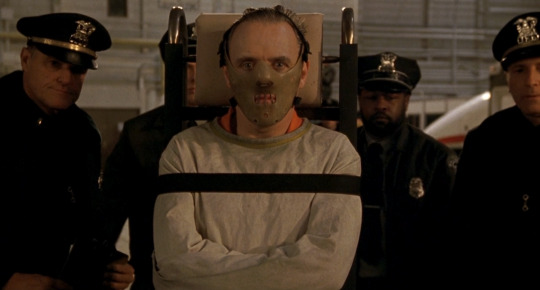
#blogtober#the silence of the lambs#thomas harris#jonathan demme#tak fujimoto#jodie foster#ted levine#brooke smith#scott glenn#clarice starling#hannibal lecter#buffalo bill#horror#adaptation#ted tally#suspense#procedural#thriller
26 notes
·
View notes
Text
Reconciliation
Ryuji attempts to apologize to Rin for poisoning him with holy water. It... doesn’t go how he expected it to.
((Alternate title: this has been in my drafts FOREVER and I finally deem it acceptable to post ))
Of all the places Suguro expected to meet his classmates from high school, the last place was outside of the son of Satan’s hospital room. And yet there Egin Yukio was, standing at the doorway with his arms crossed. “What... why are you here?”
The taller boy gave him a glare so sharp that it could cut steel. “He’s my twin brother. Why are you here?”
“You’re that de— Rin’s twin?” He has a twin? Now that it’d been pointed out to him, Ryuji felt like a moron for not piecing together sooner that Rin and his classmate from Room 1A were related— they shared the same family name, after all, and they’d shown up at True Cross at around the same time (give or take). In his defense, the demon insisted on not using his surname, and... well, the two boys simply didn’t look very much alike. Even when one disregarded the fact that they were two different species. “But you’re human!”
“When it comes to blood, Nii-san is just as human as I am, and I am just as demonic as he is. Our bodies simply express it differently.” Yukio’s tone was cold and terse throughout his entire explanation, as if he had given it before and was tired of doing so. He loomed over the other boy, sneering; it was incredibly unsettling to see him acting so differently from the kind persona he had in class. “Answer my question. What are you doing here? Come to try to finish what you started?”
So he knew Ryuji was the one who poisoned Rin. Fantastic. School was going to be a lot of fun later. “Actually… I came to apologize,” Suguro said, barely able to bring himself to get the words out of his mouth. Part of him was furious at the thought of apologizing to a demon for hurting it, but another, bigger part knew that it was the right thing to do.
“Nii-san doesn’t need apologies right now, he needs rest,” Yukio said firmly.
“Yuki,” a hoarse, weak voice called from inside the room. Yukio’s head whipped towards the speaker, his expression quickly turning from anger to concern.
“What is it, Nii-san? Is something wrong? You know you’re not well enough to speak Japanese right now,” Yukio said, retreating into the hospital room with a concerned look. Suguro almost felt like he was encroaching on something private, as if only family members were meant to see, but he took the opportunity to enter behind Yukio anyways.
There was no other word for it; Rin looked horrific. He was almost as pale as the sheets he lay on, except for the dark circles under his eyes and his blistered, angry red lips. Rin was a bit too skinny before he’d been injured, and being unable to ingest solid food for the past few days hadn’t helped any; he wasn’t skeletal quite yet, but he was very clearly underweight now. Suguro had expected him to look threatening without the glamour he usually wore, even in his injured state, but the elongated ears and bright blue cat’s eyes made him look more like an elf than a demon.
Rin was talking to Yukio in a voice barely above a whisper, but Suguro couldn’t understand a word of the snippets he could hear. It was most definitely not any human language; the words were harsh yet seemed to flow into each other, and were very clearly unpronounceable with a normal throat. Was this really easier on his throat than Japanese? Demon physiology was weird. Strangely enough, Yukio still seemed to be able to follow every syllable. The language— probably some demon dialect, Suguro realized —seemed to lend itself to sounding angry, but the expression on Rin’s face was more annoyed than anything.
“Nii-san, don’t feel like you have to forgive this—”
Rin gave some sort of stubborn retort, but the words died in his throat as soon as he realized Suguro was there. He somehow became even paler, and the shame and fear that flashed across Rin’s face made Ryuji feel sick to his stomach.
Yukio turned to glare at Ryuji, finally alerted to his presence by his older brother’s change in expression. The look on his face was murderous, and Suguro could suddenly very clearly see the ‘human’ twin’s demonic heritage. “I told you to leave my brother alone,” he snapped, his voice dropping so low that he was almost growling. “Can’t you see that he’s not comfortable with you here?” Rin had all but hidden behind his younger brother, peeking out from behind him occasionally as if gauging Ryuji’s reaction.
Ryuji ignored Yukio, making sure to lock eyes with Rin for just long enough for him to know that Suguro was speaking to him. “I don’t mind that you were speaking demon, you know,” he said, stuffing his hands in his pockets. That wasn’t entirely the truth— the language itself was unnerving, and it was annoying to have no idea what he was saying —but it was close enough. “Especially since it’s my fault you’re not well enough to speak Japanese yet.”
“Y-Youu didd th-this.” The half-demon spoke in Japanese, but at a cost; it was clearly a struggle for Rin to spit out each word, the muscles and tendons in his neck straining with each syllable. This seemed to be a recent revelation for Rin, but the half-demon didn’t look sad, angry, or even surprised. Just… tired. Suguro wished he was angry; people were supposed to get angry when someone tried to kill them, not just accept it like this.
Suguro took a deep breath. “I did,” he said, trying to keep his voice neutral to match Rin’s. “I came to apologize.”
Rin’s eyes narrowed and roamed across Ryuji’s face, as if searching for something. They were a much brighter blue than Ryuji remembered them being, so bright that they almost seemed to glow. “W-Whhy?”
“Why? Because you deserve an apology, just as much as I deserve whatever punishment you come up with for me,” Suguro blurted; he couldn’t exactly put a finger on why, but Rin’s skeptical reaction to Ryuji’s apology had really bothered him. He didn’t feel offended by Rin’s mistrust— he deserved it, honestly —so what about it was bugging him?
Rin’s look of apathetic doubt quickly turned to one of confusion as he looked over at Yukio. He spoke again in Gehennan, a question clear in his voice. It wasn’t hard to tell that this was the first time he was hearing about Suguro receiving any punishment, and it obviously surprised him.
Ryuji raised a brow. “Did Father Fujimoto seriously not tell you? He’s letting you pick what punishment I get for what I did to you. It’s only fair, after all.”
The half-demon looked like he was at a complete loss, unable to decide how exactly to proceed. He repeated whatever he’d said in demon before, looking back and forth between Yukio and Suguro. Finally, he settled on Yukio, waving him forward so that he could whisper something into his ear. Yukio looked at his brother in slight disbelief before translating.
“...My brother wants to know if helping him with his schoolwork is an acceptable punishment.” Strangely enough, Rin looked at Ryuji as if waiting for his approval. As if it was his job to tell Rin what a good punishment was. The kid really didn’t have a single vengeful bone in his body…
It was all Suguro could do not to blurt out ‘Really? That’s it?’ He should have been grateful that Rin chose such a minor punishment, but instead, it angered him that Rin didn’t respect himself enough to be truly angry at Ryuji. Unsure of what to say, he looked helplessly at Yukio and was met with a cold look. It was clear that Yukio also thought Rin’s punishment was lacking; if it was up to him, Ryuji was sure he’d have been kicked out of Cram School and sentenced to a lifetime of menial labor.
“Yes, I… I think that’s a good idea for a punishment,” Suguro said slowly, unsure of how else to word it. Rin was clearly looking for some kind of approval, but it almost felt like cheating to accept such a light punishment.
Yukio was visibly seething, but Rin seemed to be too caught up in his own relief to notice. He tugged on the younger twin’s sleeve again, murmuring something in Yukio’s ear that made the honor student clench his fists and bite his lip. He took a few deep breaths, calming himself before turning to Ryuji again. “My brother says that he is excited to have your help,” he said through gritted teeth.
Ryuji was struck speechless for a moment, unsure of how to respond. He glanced over at Rin, looking for any kind of hint that he was being sarcastic or something had been lost in translation— but nope, he was very clearly looking at Suguro with admiration he most definitely didn’t deserve. Why? Because he was top of their class? You’d think the attempted murder would cancel that out, but apparently not…
“I look forward to working with you,” he said at last, in the stiffest, most formal language he could muster up. With a ryokan owner for a mother and a head priest for a father, Suguro was rather well-versed in formal speech, and he was hoping being polite would keep Yukio from getting angry.
Rin looked confused for a moment— his speech must have sounded odd and stilted to someone not familiar with professional language —but eventually, he gave Ryuji a small smile.
As he made his way back to the dorm, Suguro wondered how he’d ever found Rin even slightly intimidating.
3 notes
·
View notes